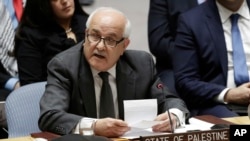The Trump administration wielded its first U.N. veto Monday, blocking a Security Council resolution that rejected the U.S. decision to recognize Jerusalem as the capital of Israel and move its embassy there.
“The United States will not be told by any country where we can put our embassy,” Ambassador Nikki Haley told council members.
The U.S. was isolated in the vote, with the other 14 members voting in favor of the text.
The draft resolution did not specifically mention the U.S. announcement, but noted its “deep regret at recent decisions concerning the status of Jerusalem.” It also said, “Any decision and actions which purport to have altered the character, status, or demographic composition of the Holy City of Jerusalem have no legal effect, are null and void and must be rescinded."
Haley noted that it is the first time in more than six years that the United States has used its veto.
“We do it with no joy, but we do it with no reluctance,” she said. “The fact that this veto is being done in defense of U.S. sovereignty and role in the Middle East peace process is not a source of embarrassment to us; it should be to the remainder of the Security Council.”
Russell Stone, a professor emeritus at American University's Center for Israel Studies, said Haley's remarks were a general expression of support for President Donald Trump's move and the United States is standing alone on the issue.
"Unspecified threats of retaliation are not very meaningful," Stone told VOA.
Haley said Trump’s decision does not contradict existing Security Council resolutions, which constitute international law and date back decades. Haley emphasized that the administration supports the status quo of the city’s holy sites and will support a two-state solution if that is what the parties want.
“It is highly regrettable that some are trying to distort the president’s position to serve their own agendas,” Haley said. She added that the U.S. had the “courage and honesty to recognize a fundamental reality” — that Jerusalem is the capital and seat of the modern Israeli government.
The text, put forward by council member Egypt, sought to reaffirm earlier resolutions that conveyed a special status on the city, which is holy to Jews, Muslims and Christians, and leaves it as a final status issue to be resolved through negotiations. Israel claims Jerusalem in whole, while Palestinians want East Jerusalem as the capital of a future state.
Egyptian Ambassador Amr Aboulatta, whose delegation drafted the text, warned of repercussions of the U.S. decision and declared that the move would have no legal effect on Jerusalem’s final status.
“Al-Quds is one of the final status issues, which must be settled through peaceful negotiations between the Palestinians and Israelis,” Aboulatta said, referring to Jerusalem by its Arabic name.
French Ambassador François Delattre told reporters. “Without an agreement on Jerusalem, there will be no peace accord. This is why an agreement on Jerusalem can only be decided by the parties themselves, with the support of the community of nations, and not by the unilateral decision of a third country that would bring us back one century ago,” he added.
While Britain’s envoy reiterated his government’s disagreement with the Trump administration’s decision, he said the U.S. would still continue to play an extremely important role in the search for peace.
“We commend President Trump for his efforts and energy in that direction, and we call on the U.S. administration to put forward concrete details, proposals, as soon as possible to take that process forward,” Ambassador Matthew Rycroft told reporters.
Palestinian envoy Riyad Mansour denounced the U.S. decision as “provocative,” “reckless and dangerous,” and said a veto could not negate the legality of existing Security Council resolutions.
“This U.S. decision will have no legal effect that will alter the character and the status of Jerusalem,” Mansour told the council. “This resolution affects the status of the U.S. as a peace broker and actually stresses its bias and undermines its role in any future peace process,” he added.
Palestinian Foreign Minister Riyad al-Maliki told reporters in the region that he would seek support from the U.N. General Assembly.
Israel’s envoy, Danny Danon, welcomed what he called the "courageous stance" of President Trump in recognizing Jerusalem as the Israeli capital.
"They can vote on this issue again and again and again," Ambassador Danon told reporters of the Security Council. "Even a hundred more times; but it will never change the fact that Jerusalem is, has been, and always will be the eternal capital of Israel."
Victor Beattie contributed to this report.





